Adam S. Miner
IMBUE: Improving Interpersonal Effectiveness through Simulation and Just-in-time Feedback with Human-Language Model Interaction
Feb 19, 2024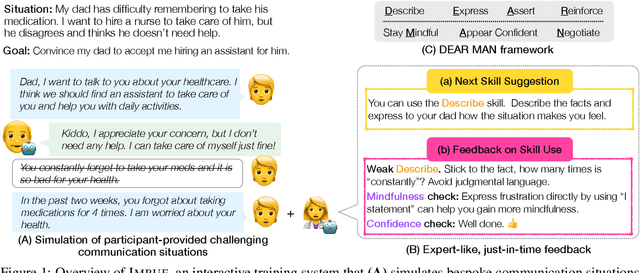

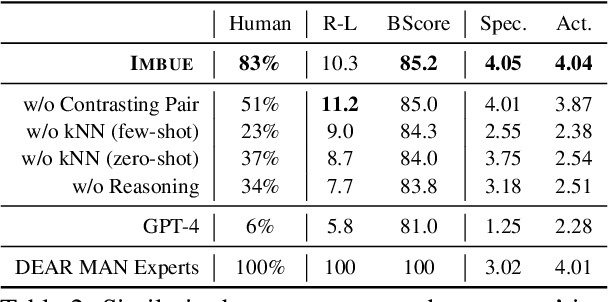

Abstract:Navigating certain communication situations can be challenging due to individuals' lack of skills and the interference of strong emotions. However, effective learning opportunities are rarely accessible. In this work, we conduct a human-centered study that uses language models to simulate bespoke communication training and provide just-in-time feedback to support the practice and learning of interpersonal effectiveness skills. We apply the interpersonal effectiveness framework from Dialectical Behavioral Therapy (DBT), DEAR MAN, which focuses on both conversational and emotional skills. We present IMBUE, an interactive training system that provides feedback 25% more similar to experts' feedback, compared to that generated by GPT-4. IMBUE is the first to focus on communication skills and emotion management simultaneously, incorporate experts' domain knowledge in providing feedback, and be grounded in psychology theory. Through a randomized trial of 86 participants, we find that IMBUE's simulation-only variant significantly improves participants' self-efficacy (up to 17%) and reduces negative emotions (up to 25%). With IMBUE's additional just-in-time feedback, participants demonstrate 17% improvement in skill mastery, along with greater enhancements in self-efficacy (27% more) and reduction of negative emotions (16% more) compared to simulation-only. The improvement in skill mastery is the only measure that is transferred to new and more difficult situations; situation specific training is necessary for improving self-efficacy and emotion reduction.
Cognitive Reframing of Negative Thoughts through Human-Language Model Interaction
May 04, 2023



Abstract:A proven therapeutic technique to overcome negative thoughts is to replace them with a more hopeful "reframed thought." Although therapy can help people practice and learn this Cognitive Reframing of Negative Thoughts, clinician shortages and mental health stigma commonly limit people's access to therapy. In this paper, we conduct a human-centered study of how language models may assist people in reframing negative thoughts. Based on psychology literature, we define a framework of seven linguistic attributes that can be used to reframe a thought. We develop automated metrics to measure these attributes and validate them with expert judgements from mental health practitioners. We collect a dataset of 600 situations, thoughts and reframes from practitioners and use it to train a retrieval-enhanced in-context learning model that effectively generates reframed thoughts and controls their linguistic attributes. To investigate what constitutes a "high-quality" reframe, we conduct an IRB-approved randomized field study on a large mental health website with over 2,000 participants. Amongst other findings, we show that people prefer highly empathic or specific reframes, as opposed to reframes that are overly positive. Our findings provide key implications for the use of LMs to assist people in overcoming negative thoughts.
Human-AI Collaboration Enables More Empathic Conversations in Text-based Peer-to-Peer Mental Health Support
Mar 28, 2022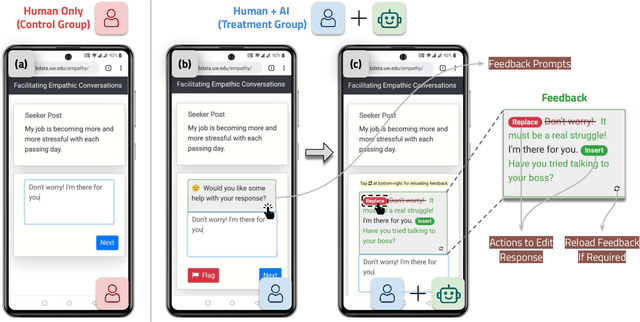
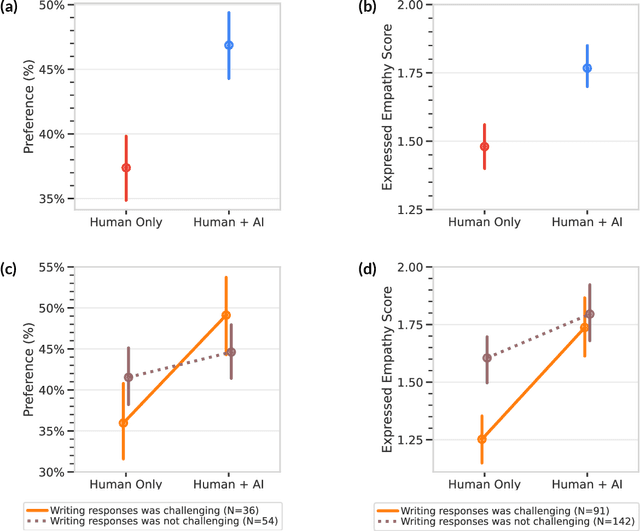
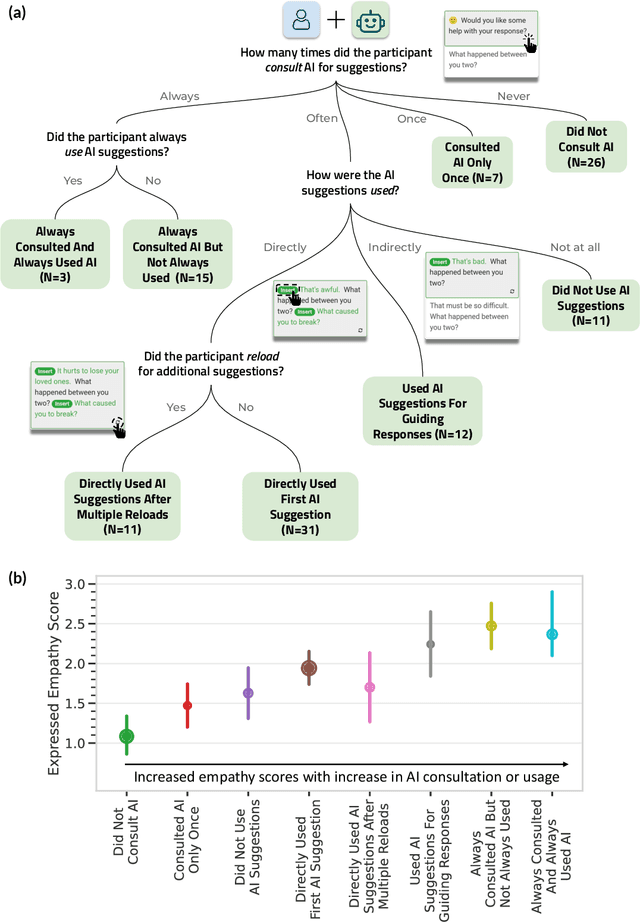
Abstract:Advances in artificial intelligence (AI) are enabling systems that augment and collaborate with humans to perform simple, mechanistic tasks like scheduling meetings and grammar-checking text. However, such Human-AI collaboration poses challenges for more complex, creative tasks, such as carrying out empathic conversations, due to difficulties of AI systems in understanding complex human emotions and the open-ended nature of these tasks. Here, we focus on peer-to-peer mental health support, a setting in which empathy is critical for success, and examine how AI can collaborate with humans to facilitate peer empathy during textual, online supportive conversations. We develop Hailey, an AI-in-the-loop agent that provides just-in-time feedback to help participants who provide support (peer supporters) respond more empathically to those seeking help (support seekers). We evaluate Hailey in a non-clinical randomized controlled trial with real-world peer supporters on TalkLife (N=300), a large online peer-to-peer support platform. We show that our Human-AI collaboration approach leads to a 19.60% increase in conversational empathy between peers overall. Furthermore, we find a larger 38.88% increase in empathy within the subsample of peer supporters who self-identify as experiencing difficulty providing support. We systematically analyze the Human-AI collaboration patterns and find that peer supporters are able to use the AI feedback both directly and indirectly without becoming overly reliant on AI while reporting improved self-efficacy post-feedback. Our findings demonstrate the potential of feedback-driven, AI-in-the-loop writing systems to empower humans in open-ended, social, creative tasks such as empathic conversations.
Towards Facilitating Empathic Conversations in Online Mental Health Support: A Reinforcement Learning Approach
Jan 19, 2021



Abstract:Online peer-to-peer support platforms enable conversations between millions of people who seek and provide mental health support. If successful, web-based mental health conversations could improve access to treatment and reduce the global disease burden. Psychologists have repeatedly demonstrated that empathy, the ability to understand and feel the emotions and experiences of others, is a key component leading to positive outcomes in supportive conversations. However, recent studies have shown that highly empathic conversations are rare in online mental health platforms. In this paper, we work towards improving empathy in online mental health support conversations. We introduce a new task of empathic rewriting which aims to transform low-empathy conversational posts to higher empathy. Learning such transformations is challenging and requires a deep understanding of empathy while maintaining conversation quality through text fluency and specificity to the conversational context. Here we propose PARTNER, a deep reinforcement learning agent that learns to make sentence-level edits to posts in order to increase the expressed level of empathy while maintaining conversation quality. Our RL agent leverages a policy network, based on a transformer language model adapted from GPT-2, which performs the dual task of generating candidate empathic sentences and adding those sentences at appropriate positions. During training, we reward transformations that increase empathy in posts while maintaining text fluency, context specificity and diversity. Through a combination of automatic and human evaluation, we demonstrate that PARTNER successfully generates more empathic, specific, and diverse responses and outperforms NLP methods from related tasks like style transfer and empathic dialogue generation. Our work has direct implications for facilitating empathic conversations on web-based platforms.
A Computational Approach to Understanding Empathy Expressed in Text-Based Mental Health Support
Sep 17, 2020



Abstract:Empathy is critical to successful mental health support. Empathy measurement has predominantly occurred in synchronous, face-to-face settings, and may not translate to asynchronous, text-based contexts. Because millions of people use text-based platforms for mental health support, understanding empathy in these contexts is crucial. In this work, we present a computational approach to understanding how empathy is expressed in online mental health platforms. We develop a novel unifying theoretically-grounded framework for characterizing the communication of empathy in text-based conversations. We collect and share a corpus of 10k (post, response) pairs annotated using this empathy framework with supporting evidence for annotations (rationales). We develop a multi-task RoBERTa-based bi-encoder model for identifying empathy in conversations and extracting rationales underlying its predictions. Experiments demonstrate that our approach can effectively identify empathic conversations. We further apply this model to analyze 235k mental health interactions and show that users do not self-learn empathy over time, revealing opportunities for empathy training and feedback.
 Add to Chrome
Add to Chrome Add to Firefox
Add to Firefox Add to Edge
Add to Edge